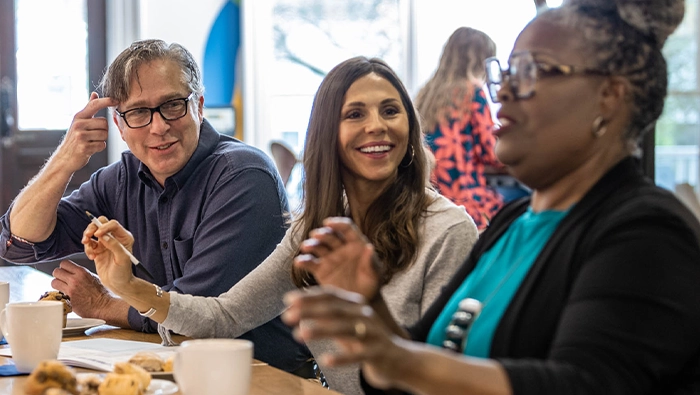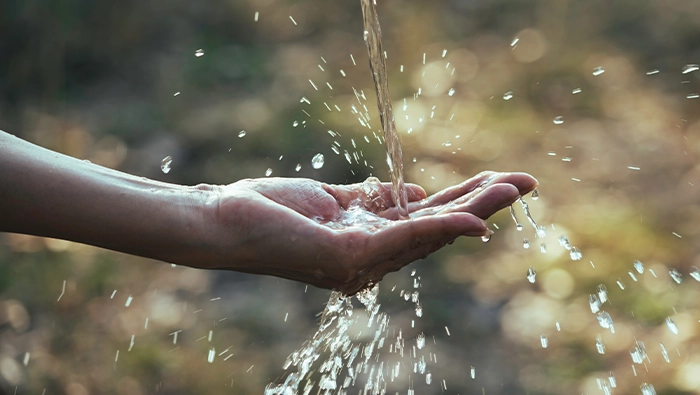A Colorado club celebrating its 50th pancake fundraiser gives advice on this signature Kiwanis event.
By Erin Chandler
In communities around the world, there are people who know their local Kiwanis club for one thing above all else: serving pancakes. Whether it’s called a pancake breakfast, a pancake feed or just a pancake day, it’s a great way to raise funds for community projects. And it has earned its place as a Kiwanis classic: Some clubs have held annual pancake breakfasts for over 60 years!
On July 4, the Kiwanis Club of Alamosa, Colorado, U.S., celebrated its 50th pancake breakfast. Below, club treasurer Doris Roberts shares some tips for clubs looking to launch their own pancake-based fundraiser — and for those looking to sustain such a project long-term.
Recruit sponsors. Months before the Kiwanis Club of Alamosa’s pancake breakfast takes place, the club is busy recruiting businesses and individuals to sponsor the event. In fact, Roberts says, most of the money to fund the event comes from these sponsors. “That is how we can keep it at such an affordable price for the community [attendees] as well,” Roberts says.
Call on your community. When hosting a big event, the need for assistance often goes beyond the financial. You may need extra volunteers to help set up and tear down, serve food and drinks, or donate supplies. Roberts recommends reaching out to:
- Schools. If your club sponsors a Service Leadership Program, your pancake breakfast could be a great opportunity for its members to serve your shared community. If not, many schools have clubs that would be willing to help — including organizations that require members to complete service hours, like the National Honor Society. The Kiwanis Club of Alamosa calls on the Adams State University football team to provide extra manpower on the day of its pancake breakfast.
- Other service organizations. Local Rotary, Lions, Optimist and other service clubs in your area might be interested in partnering with you. (And don’t forget: Celebrate Community is in September.) The Kiwanis Club of Alamosa uses the industrial kitchen at the local Elks Lodge to wash dishes, and Elks also help with cleanup.
- Local breakfast-food businesses. A nearby IHOP donates pancake batter and syrup to the Alamosa club, and a local coffee shop provides coffee at a discount. Try reaching out to restaurants in your area that serve pancakes and other breakfast foods.
Reach out to other Kiwanis clubs. One side effect of the pancake breakfast’s popularity among Kiwanis clubs is that nearby clubs may have experience hosting them. They might be willing to share advice — and even supplies. The Kiwanis Club of Alamosa borrows a “huge rotating grill” built specifically to make pancakes from the Kiwanis Club of Center. “It is awesome and makes a bunch of pancakes,” Roberts says.
Reward your sponsors and helpers. Free advertising is a great way to thank sponsors. The Kiwanis Club of Alamosa displays sponsors’ logos on a large banner and on placemats at every table. And in appreciation for the football players who give their time, the club donates to their athletic department.
Embrace the advantages of longevity. Keeping an event going for decades presents its fair share of challenges, but there are benefits too. After 50 years, the entire community of Alamosa — Kiwanians, sponsors, helpers and hungry families — knows what to expect from the Kiwanis Pancake Breakfast. The event has become a beloved tradition for everyone involved. “We have the same vendors each year,” Roberts says, “and they’re always very helpful to ensure their part of the breakfast gets done.”
That loyalty extends to attendees; the club serves over 2,000 people each year.
“To be honest with you, we’ve done our breakfast for so long that it’s now like a well-oiled machine,” Roberts says. “With all of the extra help and the great members we have, we pull it off.
“While I won’t lie, it is a lot of work, it is a great fundraiser — and very rewarding when it’s complete.”



